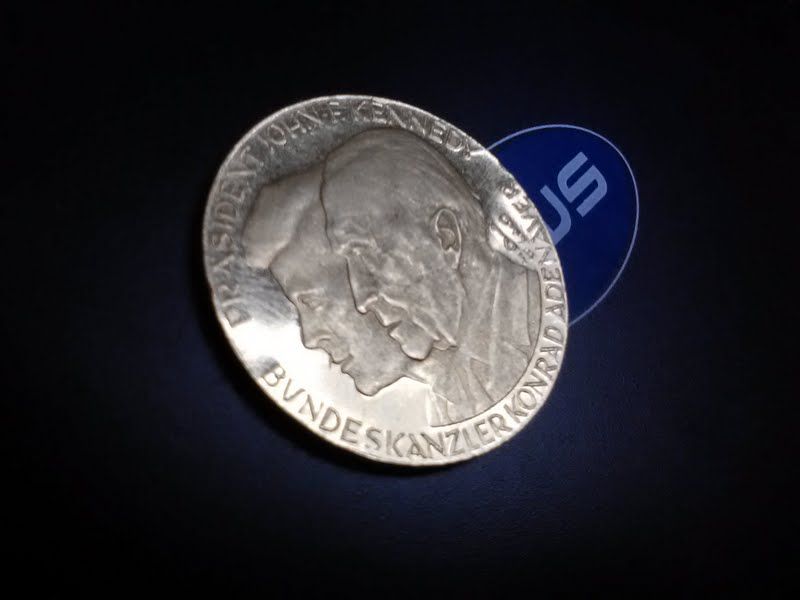 by beauanderos » Wed Sep 19, 2012 5:23 pm
by beauanderos » Wed Sep 19, 2012 5:23 pm
Dear Urban Legends:
I have heard and read from several different sources the story that John F. Kennedy made a major German language blunder in his famous "Ich bin ein Berliner" speech in Berlin, Germany. The story goes that he should have said "Ich bin Berliner" ("I am a citizen of Berlin"), and that "Ich bin ein Berliner" really means "I am a jelly doughnut." (A "Berliner" is in fact a type of jelly doughnut made in Berlin.) One of my German instructors even claimed this is true, and I once saw it published in a major American magazine, although I forget which one.
Several years ago when I visited Germany, I found myself having drinks with a German journalist who struck me as fairly intelligent, so I asked her the question. She said that it is certainly not true. President Kennedy said the phrase absolutely correctly, although possibly with a thick American accent. It seems that the German language is simply not that trivial — it has subtleties that very few non-native speakers grasp. She said that if President Kennedy had said "Ich bin Berliner," he would have sounded silly because with his heavy accent he couldn't possibly have come from Berlin. But by saying "Ich bin ein Berliner," he actually said "I am one with the people of Berlin." This is her exact translation as best I can remember it.
I believe, although someone would have to verify it, that President Kennedy actually didn't know German very well, if at all. He had a German journalist translate the phrase for him, and that journalist coached him at length on exactly how to say the phrase.
Dear Reader:
Your friend, the journalist, was on the mark. Notwithstanding reports to the contrary in venues as prestigious as the New York Times and Newsweek magazine, this is truly The Gaffe That Never Was. Experts say Kennedy's grammar was flawless when he uttered those words on June 26, 1963. The phrase was translated for him by a professional interpreter.
Parenthetically, it's true that in some parts of Germany the word Berliner can just as well denote a certain kind of jelly-filled pastry as a citizen of Berlin, but look at it this way: if I were to tell a group of Americans that my editor is a New Yorker, would any of them really think I'd confused him with the weekly magazine of the same name?
Laying decades of misinformation to rest, linguist Jürgen Eichhoff undertook a concise grammatical analysis of Kennedy's statement for the academic journal Monatshefte in 1993. "'Ich bin ein Berliner' is not only correct," Eichhoff wrote, "but the one and only correct way of expressing in German what the President intended to say."
An actual Berliner would say, in proper German, "Ich bin Berliner." But that wouldn't have been the correct phrase for Kennedy to use. The indefinite article "ein" is required, Eichhoff explained, to express a metaphorical identification between subject and predicate. Otherwise, the speaker could be taken to say he is literally a citizen of Berlin, which was not Kennedy's intention.
To give another example, the German sentences "Er ist Politiker" and "Er ist ein Politiker" both mean "He is a politician," but they're understood by German speakers as different statements with different meanings. The first means, more exactly, "He is (literally) a politician." The second means "He is (like) a politician." You would say of Barack Obama, "Er ist Politiker." But you would say of an organizationally astute coworker, "Er ist ein Politiker."
So, while the proper way for a Berlin resident to say "I am a Berliner" is "Ich bin Berliner," the proper way for a non-resident to say he's a Berliner in spirit is precisely what Kennedy said: "Ich bin ein Berliner." In spite of the fact that it can also be the correct way to say "I am a jelly donut," no adult German speaker could possibly have misunderstood Kennedy's meaning in context, or regarded it as a mistake.
The translator
The man who actually translated the words into German for JFK is was Robert Lochner, the son of Associated Press correspondent Louis P. Lochner. The younger Lochner, educated in Berlin and a fluent speaker of German, was Kennedy's official interpreter on his visit to Germany. Lochner translated the phrase on paper then rehearsed it with JFK in Berlin Mayor Willy Brandt's office right up to the moment the speech was to be delivered.
We can be thankful, in the interests of international peace and harmony, that the president was well-coached that day before addressing his audience in their native tongue. Otherwise, God forbid, he might have stood before the German people and claimed to be a croissant. Quelle horreur!
Perpetuating the myth:
Following are examples of the "I'm a jelly donut" tale making the rounds in the media and on the Internet in recent years:
•The Jelly Doughnut
Anonymous pundit says: "His slip-up was overlooked. Can you imagine today how the media would respond if Dan Quayle tried to get away with that one?"
•A Berliner Remembers...
Margit Hosseini, who heard the speech as a young girl, claims she laughed at Kennedy's reference to a "pancake." Apparently she was the only one who did.
•And Yes, Even CNN...
Website Blurb: "Unfortunately he was not only saying 'I am a Berliner," he was also saying 'I am a jelly doughnut'..."
The Hand of God moves Worlds





